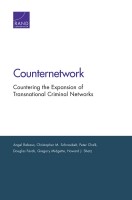| 来源类型 | Research Reports
|
| 规范类型 | 报告
|
| DOI | https://doi.org/10.7249/RR1481
|
| ISBN | 9780833094773
|
| 来源ID | RR-1481-A
|
| Counternetwork: Countering the Expansion of Transnational Criminal Networks |
| Angel Rabasa; Christopher M. Schnaubelt; Peter Chalk; Douglas Farah; Greg Midgette; Howard J. Shatz
|
| 发表日期 | 2017
|
| 出版年 | 2017
|
| 页码 | 214
|
| 语种 | 英语
|
| 结论 |
Countering Transnational Organized Crime Is a New Mission for the Department of Defense- Success in counternarcotics has been traditionally measured by the amount of illicit drugs interdicted.
- However, even if drug flow reduction goals are met, the drug trafficking infrastructure would still be in place.
- Countering transnational criminal networks requires identifying the critical nodes in the criminal organizations and determining where operations can achieve the greatest effect.
- Gaps in authorities may create difficulties in military abilities to participate in this effort.
Destabilizing Effects of Transnational Criminal Networks- These criminal organizations take root in supply areas and transportation nodes while usurping the host nations' basic functioning capacity.
- Over time, the illicit economy grows and nonstate actors provide an increasing range of social goods and fill the security and political vacuum that emerges from the gradual erosion of state power, legitimacy, and capacity.
The U.S. Army Could Play a Role in Combating Transnational Criminal Networks- Combating transnational criminal organizations is an endeavor in which the Army could help develop interagency and multinational strategies to more effectively counter these organizations and then assist with planning to implement those strategies.
- Such initiatives would constitute a valuable expansion from the Army's current efforts to build partner capacity, perform network analysis, and support detection and monitoring.
|
| 摘要 |
- The U.S. government could bring authorities and policy guidance in line with the strategy to combat transnational organized crime.
- Interagency efforts to combat these networks could be improved, roles could be better defined, and joint doctrine could be developed.
- The Army could take several steps to clarify its role in countering criminal networks, including participating in strategy development, increasing support to network analysis efforts, and working with partner nations and militaries to help them strengthen border control.
|
| 主题 | Africa
; Border and Port Security
; Central America
; Counterterrorism
; Crime
; Illegal Drug Trade
; Mexico
; Military Doctrine
; United States Army
|
| URL | https://www.rand.org/pubs/research_reports/RR1481.html
|
| 来源智库 | RAND Corporation (United States)
|
| 引用统计 |
|
| 资源类型 | 智库出版物
|
| 条目标识符 | http://119.78.100.153/handle/2XGU8XDN/108496
|
推荐引用方式
GB/T 7714 |
Angel Rabasa,Christopher M. Schnaubelt,Peter Chalk,et al. Counternetwork: Countering the Expansion of Transnational Criminal Networks. 2017.
|
|
文件名:
|
x1495316292898.jpg
|
|
格式:
|
JPEG
|

|
文件名:
|
RAND_RR1481.pdf
|
|
格式:
|
Adobe PDF
|
除非特别说明,本系统中所有内容都受版权保护,并保留所有权利。